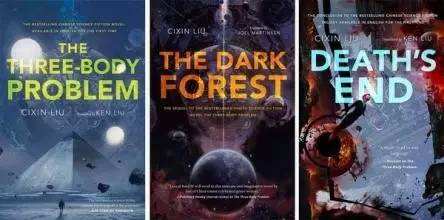
. > WHAT'S NEW > RESEARCH
Posthumanism expands literary discussions
Author : ZHANG CONG, CAO YUE Source : Chinese Social Sciences Today 2017-10-30

The 2015 Hugo Award for Best Novel, Remembrance of Earth’s Past, also known as The Three-Body Problem, described how the earth was attacked by alien life. Scientific perspectives are breathing new life into literary theories.
Advancements in media, neurosciences, biosciences and AI have broadened the definition of humanity. Scientific perspectives are breathing new life into literary theories. On Sept. 24, the symposium “The Future of Literary Theory in Posthumanism Context” was held in Shanghai and sponsored by the editorial department of Theoretical Studies in Literature and Art. More than 40 experts and scholars from universities, research institutions, as well as art and media communities conducted in-depth discussions on related topics at the forum.
Updated research viewsIn recent years, the emergence of science fiction and machine literature can be regarded as a typical example of literary development and artistic innovation in various forms. Facing these changes, it is important to update and expand the methods and perspectives of literary theory.
Wang Feng, a professor of Chinese from East China Normal University, argued that the posthumanism context does not imply future realities. It intend to depict present interests with the help of future concerns.
Maximilian Mayer, a researcher from the Germany Research Center at Tongji University, said scholars should pay attention to the future living conditions of humans, as well as political, technical, emotional and legal challenges humans will have to deal with in the future.
Fu Xiuyan, a professor from Jiangxi Normal University, said we have to pay special attention to the mental state of humanity. He studied the inner voices of the characters in narrative works and suggested that people were not born with subject consciousness.
Yin Jing, an associate professor of English from China Foreign Affairs University, said in the posthumanism context, human-oriented literature has become “event literature.” Event literature creates nomadic subjects through various forms, and expects readers to create possibilities for new meanings, identities and lifestyles.
N. Katherine Hayles, a professor from Duke University, said that the current posthumanism context is a historical phenomenon. It is also a way of thinking and form of existence. Affirming this literary context means acknowledging the significance of the unconscious cognition of humans and other forms of life and cognitive devices.
Xie Xuemei, an associate professor of Chinese from Yunnan University, pointed out that the emergence of machine literature in the posthumanism context is essential to considerations of the importance of literature and literary crises. In the comparison of the creative logic of machine literature and human literature, it is highlighted that the crisis of literature is a crisis of language and humnity.
Lu Wenchao, an associate professor from the School of Art at Southeast University, argued that the difference between AI works and human works is not the difference between art and nature, but the difference in artistic events.
Expanding literary theories
Participants also discussed ethical issues in depth, including humanism and animal ethics, based on real conditions. Wu Guanjun, a professor of political science at East China Normal University, pointed out that the concept of an “anthropological machine” proposed by Giorgio Agamben may help us grasp the position of robots in the present human community. He suggested focusing on the ecological changes faced by humanity in the discussion of artificial intelligence.
Wang Xingkun, an associate professor from the School of Foreign Languages at Tianjin Polytechnic University, said we must not only understand the animalization of people exposed by Agamben, but more importantly, recognize the social and economic roots behind them.
Lan Jiang, a professor of philosophy from Nanjing University, said contemplation on the definition of human nature should return to the understanding of the relationship between people and animals. The distinction between man and animal is not constant, and in different times this distinction needs to be reconstructed.
Wang Jiajun, an associate senior editor of the Theoretical Studies in Literature and Art studied Emmanuel Levinas and Derrida’s discussion on animal issues, and concluded that through Derrida’s development, Levinas’s ethics can be extended to the field of animal ethics. Professor Han Song from the department of English at Nanjing University focused on Donna Haraway’s animal ethics, and discussed the expression possibility of companion species literature.
Tang Daixing, a professor of literature from Sichuan Normal University, argued that it is essential to first address the cognitive issues of technology in order to seek solutions for ethical dilemma in the scientific context.
In addition, scholars discussed literary and artistic research paradigms in the future from multiple perspectives, such as digital humanities, emotional theory and material.
Ye Shengtao made Chinese fairy tales from a wilderness
Ye Shengtao (1894–1988) created the first collection of fairy tales in the history of Chinese children’s literature...
-
How northern ethnicities integrated into Chinese nation
2023-09-18
-
Mogao caves
2023-09-12
-
Mogao Grottoes as ‘a place of pilgrimage’
2023-09-12
-
Time-honored architectural traditions in China
2023-08-29
-
Disentangling the civilizational evolution of China
2023-08-28
-
AI ethics in science fiction
2023-08-23













 2011-2013 by www.cssn.cn. All Rights Reserved
2011-2013 by www.cssn.cn. All Rights Reserved